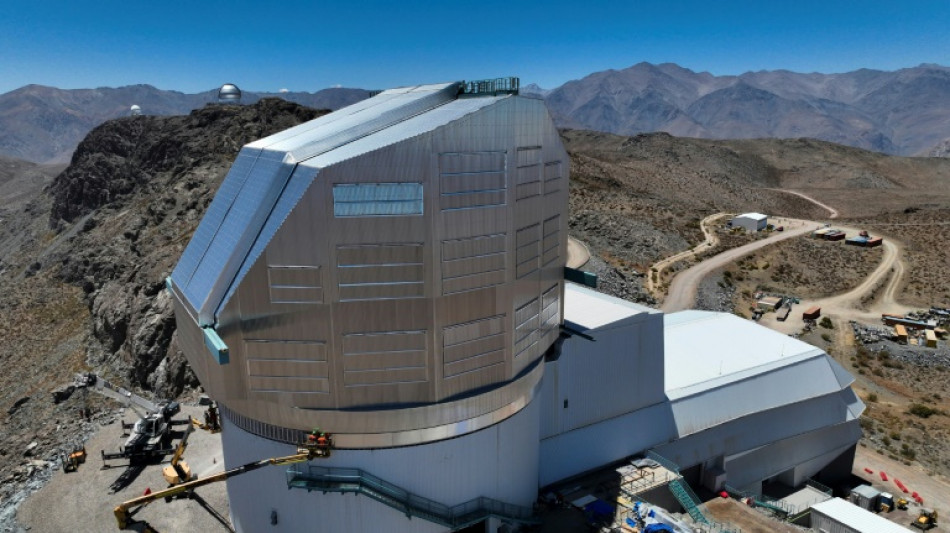
-
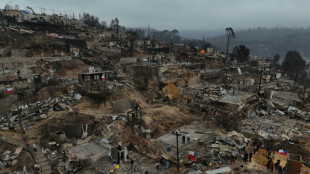 Chile police arrest suspect over deadly wildfires
Chile police arrest suspect over deadly wildfires
-
Djokovic eases into Melbourne third round - with help from a tree

-
 Keys draws on champion mindset to make Australian Open third round
Keys draws on champion mindset to make Australian Open third round
-
Knicks halt losing streak with record 120-66 thrashing of Nets

-
 Philippine President Marcos hit with impeachment complaint
Philippine President Marcos hit with impeachment complaint
-
Trump to unveil 'Board of Peace' at Davos after Greenland backtrack

-
 Bitter-sweet as Pegula crushes doubles partner at Australian Open
Bitter-sweet as Pegula crushes doubles partner at Australian Open
-
Hong Kong starts security trial of Tiananmen vigil organisers
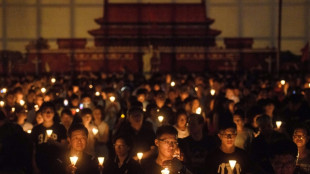
-
 Keys into Melbourne third round with Sinner, Djokovic primed
Keys into Melbourne third round with Sinner, Djokovic primed
-
Bangladesh launches campaigns for first post-Hasina polls

-
 Stocks track Wall St rally as Trump cools tariff threats in Davos
Stocks track Wall St rally as Trump cools tariff threats in Davos
-
South Korea's economy grew just 1% in 2025, lowest in five years

-
 Snowboard champ Hirano suffers fractures ahead of Olympics
Snowboard champ Hirano suffers fractures ahead of Olympics
-
'They poisoned us': grappling with deadly impact of nuclear testing
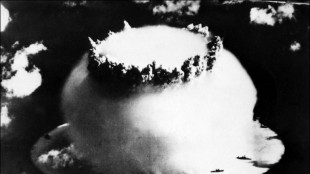
-
 Keys blows hot and cold before making Australian Open third round
Keys blows hot and cold before making Australian Open third round
-
Philippine journalist found guilty of terror financing

-
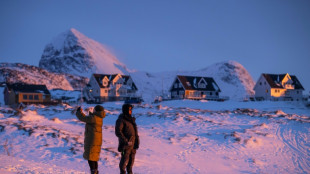 Greenlanders doubtful over Trump resolution
Greenlanders doubtful over Trump resolution
-
Real Madrid top football rich list as Liverpool surge

-
 'One Battle After Another,' 'Sinners' tipped to top Oscar noms
'One Battle After Another,' 'Sinners' tipped to top Oscar noms
-
Higher heating costs add to US affordability crunch
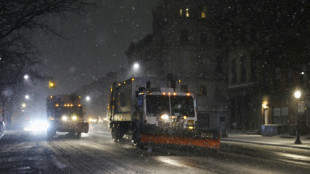
-
 Eight stadiums to host 2027 Rugby World Cup matches in Australia
Eight stadiums to host 2027 Rugby World Cup matches in Australia
-
Plastics everywhere, and the myth that made it possible

-
 Interim Venezuela leader to visit US
Interim Venezuela leader to visit US
-
Australia holds day of mourning for Bondi Beach shooting victims

-
 Liverpool cruise as Bayern reach Champions League last 16
Liverpool cruise as Bayern reach Champions League last 16
-
Fermin Lopez brace leads Barca to win at Slavia Prague

-
 Newcastle pounce on PSV errors to boost Champions League last-16 bid
Newcastle pounce on PSV errors to boost Champions League last-16 bid
-
Fermin Lopez brace hands Barca win at Slavia Prague

-
 Kane double fires Bayern into Champions League last 16
Kane double fires Bayern into Champions League last 16
-
Newcastle pounce on PSV errors to close in on Champions League last 16

-
 In Davos speech, Trump repeatedly refers to Greenland as 'Iceland'
In Davos speech, Trump repeatedly refers to Greenland as 'Iceland'
-
Liverpool see off Marseille to close on Champions League last 16

-
 Caicedo strikes late as Chelsea end Pafos resistance
Caicedo strikes late as Chelsea end Pafos resistance
-
US Republicans begin push to hold Clintons in contempt over Epstein

-
 Trump says agreed 'framework' for US deal over Greenland
Trump says agreed 'framework' for US deal over Greenland
-
Algeria's Zidane and Belghali banned over Nigeria AFCON scuffle

-
 Iran says 3,117 killed during protests, activists fear 'far higher' toll
Iran says 3,117 killed during protests, activists fear 'far higher' toll
-
Atletico frustrated in Champions League draw at Galatasaray

-
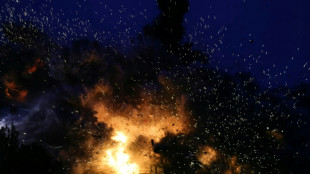 Israel says struck Syria-Lebanon border crossings used by Hezbollah
Israel says struck Syria-Lebanon border crossings used by Hezbollah
-
Snapchat settles to avoid social media addiction trial

-
 'Extreme cold': Winter storm forecast to slam huge expanse of US
'Extreme cold': Winter storm forecast to slam huge expanse of US
-
Jonathan Anderson reimagines aristocrats in second Dior Homme collection

-
 Former England rugby captain George to retire in 2027
Former England rugby captain George to retire in 2027
-
Israel launches wave of fresh strikes on Lebanon
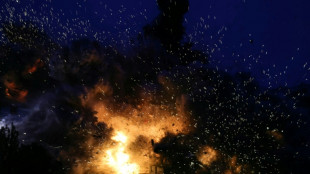
-
 Ubisoft unveils details of big restructuring bet
Ubisoft unveils details of big restructuring bet
-
Abhishek fireworks help India beat New Zealand in T20 opener

-
 Huge lines, laughs and gasps as Trump lectures Davos elite
Huge lines, laughs and gasps as Trump lectures Davos elite
-
Trump rules out 'force' against Greenland but demands talks

-
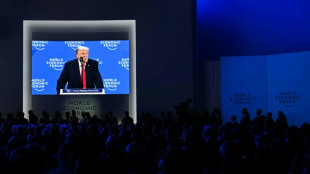 Stocks steadier as Trump rules out force to take Greenland
Stocks steadier as Trump rules out force to take Greenland
-
World's oldest cave art discovered in Indonesia
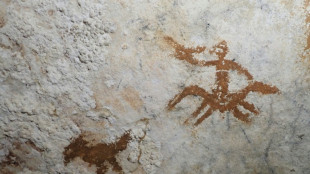

Astronomers in Chile to scour universe with car-sized mega camera
Surrounded by the desert mountains and clear blue sky of northern Chile, astronomers from the Vera C. Rubin Observatory hope to revolutionize the study of the universe by affixing the world's largest-ever digital camera to a telescope.
The size of a small car and weighing 2.8 metric tons, the sophisticated piece of equipment will reveal views of the cosmos as never before, officials from the US-funded project told AFP.
Beginning in early 2025, when the $800 million camera will snap its first photos, the machine will sweep the sky every three days, allowing scientists to reach new heights in their galactic analyses.
Researchers will be able to go from "studying one star and knowing everything in-depth about that one star, to studying thousands of stars at a time," said Bruno Dias, president of the Chilean Society of Astronomy (Sochias).
According to Stuartt Corder, deputy director of NOIRLab, the US research center running the observatory located 2,500 meters (8,200 feet) up the Cerro Pachon mountain, 560 kilometers (350 miles) north of Santiago, the new facility will usher in "a paradigm shift in astronomy."
The project solidifies Chile's dominant position in astronomical observation, as the South American country is home to a third of the globe's most powerful telescopes, according to Sochias, and boasts among the clearest skies on the planet.
The Rubin Observatory camera's first task will be to complete a 10-year review of the sky, called the Legacy Survey of Space and Time (LSST), which researchers hope will reveal information about 20 million galaxies, 17 billion stars and six million space objects.
The survey will give scientists an up-to-date inventory of images of the solar system, allow them to map our own galaxy, the Milky Way, and delve deeper into the study of energy and dark matter.
- 300 TVs for one picture -
The new camera will be able to capture 3,200-megapixel photos -- resulting in images so large they would require more than 300 average-size high-definition televisions, lined up together, to view just one.
The machine, built in California, will have triple the capacity of the world's current most powerful camera, the 870-megapixel Hyper Suprime-Cam in Japan, and will have six times the capacity of NOIRLab's most powerful camera.
The lab's existing top camera, on Chile's Cerro Tololo mountain, is only 520 megapixels, according to Jacques Sebag, head of construction of the Rubin telescope.
Chile's telescopes have come a long way since the 40-centimeter Cerro Tololo telescope, at the country's first international observatory, installed in the 1960s.
"That telescope arrived here on the back of a mule, because there was no road," said Stephen Heathcote, director of the Cerro Tololo Inter-American Observatory, only 20 kilometers from Cerro Pachon.
- Astronomy capital of the world -
The Vera C. Rubin Observatory, named in honor of the US astronomer who discovered dark matter, will join several other space observation research centers in northern Chile.
The natural conditions of the region's desert landscape -- tucked between the Pacific Ocean and the Andes mountain range -- creates the clearest skies on the planet, thanks to a dry climate with little cloud cover.
The area plays host to telescopes from more than 30 countries, including some of the most powerful astronomical instruments in the world, such as the radio telescope at the ALMA Observatory and the under-construction Extremely Large Telescope, which by 2027 is set to be able to view never-before-seen reaches of the universe.
Many of humanity's most important astronomical discoveries have been made at the Cerro Tololo observatory, such as the 2011 Nobel Prize-winning revelation that expansion of the universe is picking up speed, a phenomenon known as cosmic acceleration.
Though other influential observatories have been opened around the globe, including in the United States, Australia, China and Spain, "Chile is unbeatable" in the world of astronomy, said Dias, the Sochias president.
F.Wagner--VB




